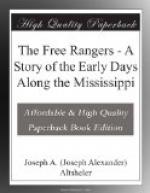While the five were engaged in this task, rabbais, or peddling merchants, some Provencals and some Catalans came to sell them goods, which they carried in coffin-shaped vehicles pushed before them. They had wares, mostly small articles from Spain and France and the West Indies. Colored women carrying immense cans of milk or coffee on their heads passed by or lingered in hope of a sale. Others were calling for sale callas and cakes tous chauds in monotonous, drawling voices. Negresses, also, were trying to sell belles chandelles, which were dirty candles made from green myrtle wax, the chief light then sold in the city.
The five understood the gestures of this rabble, although not their words, and waved them away, not caring to buy anything.
“Keep cool, Jim! keep cool!” said Shif’less Sol. “Don’t shoot. They don’t want to kill you; they jest want to rob you.”
“Depends on what they want to rob me uv,” replied Long Jim with a grin. “I never had more’n ten shillin’s at one time in my life, an’ I’ve got a purty strong grip on my rifle an’ the clothes that I hev on.”
“I think we’d better go ashore an’ do a little scoutin’,” said Tom Ross. “It’s always well to know the groun’ on which you’re goin’ to act.”
“No doubt of it, Tom,” said Henry, “and we’ll all go together.”
They had a little money of English coinage which was taken readily in cosmopolitan New Orleans, and with two shillings they hired a levee watchman, whom they judged they could trust, to look after “The Galleon.” Then, rifle on shoulder, they entered the fortified city by the gate called Chemin des Tchoupitoulas. Spain, officially at least, was the friend of the colonies and the enemy of England, and the sentinels at the gate readily passed them after a few questions.
Here they asked again for the Governor General, Bernardo Galvez, and the statement of Lieutenant Diego Bernal that he could not be seen was confirmed. He had arrived only a few hours before from a two days’ expedition down the river, and was now immersed in important papers that had awaited his coming.
They saw the Governor General’s house, a one-story building fronting the river with a gallery on one side, gardens on the other, and kitchen and outbuildings behind. They looked longingly at it, as they desired very much to see Bernardo Galvez at once. But presently they passed on into the Place d’Armes, a wide open space used as a review ground. At the very moment they entered it a company of Spanish soldiers were going through their evolutions, and, after the fashion of to-day, children and their dark-faced nurses were watching them. The five did not think much of the soldiers, who seemed to them to be dwarfed and without zeal.
“Ef ever Kentucky comes down the long river,” said Shif’less Sol, “it will take bigger men than these to hold her back.”
Paul’s gaze wandered from the soldiers, and he saw in a corner of the Place d’Armes a great wooden gallows that made him shudder. It was a gallows very often used, too, and any one could have pointed out to Paul the spot in the middle of the Place d’Armes where five gallant French gentlemen, among the best citizens of New Orleans, had been shot not long before for planning to throw off the rule of Spain and make Louisiana a free republic.




